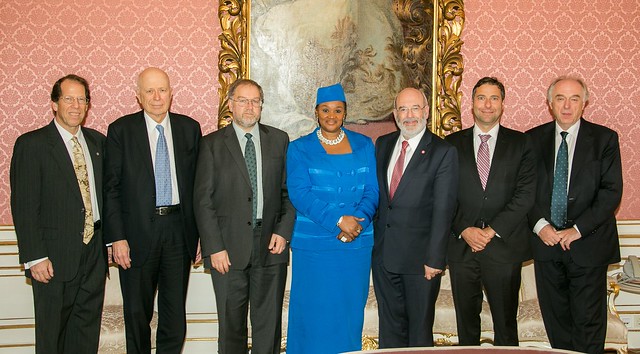Global S&T Development Trend Analysis Platform of Resources and Environment
| Science and technology advice is a vital element for foreign ministries | |
| admin | |
| 2016-10-20 | |
| 发布年 | 2018 |
| 语种 | 英语 |
| 国家 | 奥地利 |
| 领域 | 气候变化 |
| 正文(英文) | Science can play a vital role in furthering a country’s objectives on the international stage, said speakers yesterday at the International Institute for Applied Systems Analysis (IIASA). The meeting, co-organized by IIASA, the Fletcher School of Law and Diplomacy at Tufts University, and the International Network of Government Science Advice, brought together diplomats and scientists from 21 nations for the first international dialogue on science and technology advice to foreign ministries. Speakers including the science and technology advisers to foreign ministers for five countries (see photo), Director General and CEO of IIASA Professor Dr. Pavel Kabat, and Professor of Practice in Science Diplomacy Paul Berkman of the Fletcher School showed multiple examples of how a country’s objectives can be furthered through diplomats and scientists working together, for example:
During the meeting participants shared experiences and best practices in providing scientific advice to ministers from strategic, structural, and tactical perspectives; as well as identifying practical issues, such as how best to engage with scientific institutions, facilitate scientific advice in embassies, and equip diplomats with scientific skills and knowledge. Next steps include the development of a one-week course for science diplomacy in relation to achieving the Sustainable Development Goals. The meeting was also a further step in the development of a Global Network of Science and Technology Advisers in Foreign Ministries, which aims to increase the input of science and technology advice to foreign policy decision-making and diplomacy. The current network of science and technology advisers to foreign ministers, which consists of the five countries that currently have this role (Japan, New Zealand, Senegal, United Kingdom and United States), met on the margins of the meeting. As more countries develop the position of science and technology advisers to foreign ministers, they will be invited to participate in future network meetings. The international dialogue took place from October 18-19, 2016 at IIASA in Laxenburg near Vienna, Austria, and was attended by senior diplomatic or scientific representatives from 21 different countries (Armenia, Austria, Belgium, Canada, Chile, Colombia, Georgia, Ireland, Italy, Kenya, Japan, New Zealand, Oman, Panama, Poland, Russian Federation, Senegal, Spain, Switzerland, United Kingdom, United States).  From left to right: Professor Paul Berkman (Professor of Practice in Science Diplomacy, Fletcher School of Law and Diplomacy, Tufts University and Director, Arctic Futures Initiative, IIASA); Dr. William Colglazier (Visiting Scientist, AAAS Center for Science Diplomacy and Former Scientific Adviser to the Secretary of State, USA); Professor Robin Grimes (Chief Scientific Adviser to the Foreign and Commonwealth Office, United Kingdom); Professor Aminata Sall Diallo (Science Adviser to the Ministry Of Foreign Affairs and Senegalese Abroad, Ministry Of Foreign Affairs and Senegalese Abroad, Senegal); Professor Sir Peter Gluckman (Chief Science Adviser to the Prime Minister, Ministry of Foreign Affairs and Trade, New Zealand); Dr. Vaughan Turekian (Science and Technology Adviser to the Secretary of State, U.S. Department of State, USA); Professor Dr. Pavel Kabat (Director General and CEO, International Institute for Applied Systems Analysis (IIASA)) © Matthias Silveri | IIASA About IIASA About INGSA INGSA operates under the auspices of the International Council for Science, which acts as trustee of INGSA funds and hosts its governance committee. INGSA’s secretariat is based in the Office of the Prime Minister’s Chief Science Advisor in New Zealand About The Fletcher School The Fletcher School awards professional degrees, including a two-year Master of Arts in Law and Diplomacy (MALD); a one-year Master of Arts for mid-career professionals; a one-year, mid-career combined Internet-mediated/residential Global Master of Arts (GMAP); a Ph.D. program; a Master of Arts in International Business (MIB); and a Master of Laws in International Law (LL.M.)—as well as joint degrees, summer school and certificate programs. More photos:  |
| URL | 查看原文 |
| 来源平台 | International Institute for Applied Systems Analysis (IIASA) |
| 文献类型 | 新闻 |
| 条目标识符 | http://119.78.100.173/C666/handle/2XK7JSWQ/98910 |
| 专题 | 气候变化 |
| 推荐引用方式 GB/T 7714 | admin. Science and technology advice is a vital element for foreign ministries. 2016. |
| 条目包含的文件 | 条目无相关文件。 | |||||
| 个性服务 |
| 推荐该条目 |
| 保存到收藏夹 |
| 查看访问统计 |
| 导出为Endnote文件 |
| 谷歌学术 |
| 谷歌学术中相似的文章 |
| [admin]的文章 |
| 百度学术 |
| 百度学术中相似的文章 |
| [admin]的文章 |
| 必应学术 |
| 必应学术中相似的文章 |
| [admin]的文章 |
| 相关权益政策 |
| 暂无数据 |
| 收藏/分享 |
除非特别说明,本系统中所有内容都受版权保护,并保留所有权利。
修改评论